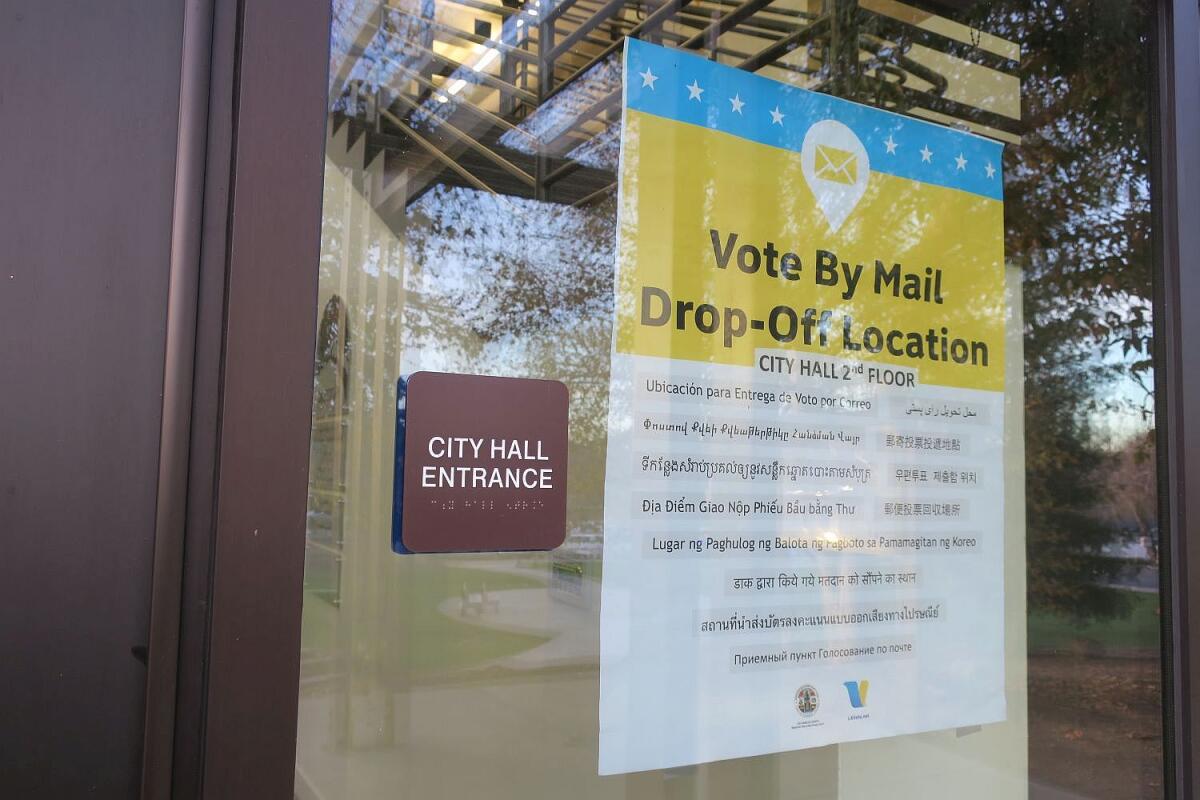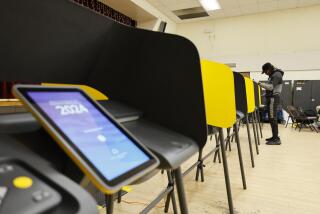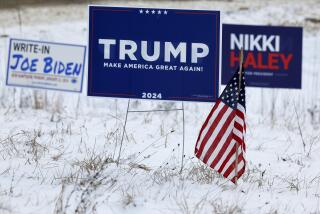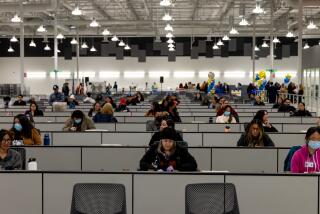Op-Ed: Can’t call the Super Tuesday vote? Be patient

Americans are increasingly worried that the 2020 presidential election will not be safe and secure. The news media have done a good job covering the threats, but lost in the headlines about cybersecurity concerns, occasional election administrator incompetence and claims of voter fraud and suppression is journalists’ — especially cable-news journalists’ — own dangerous behavior: breathless reporting on delays in election results and shifts in vote totals from one party to another. This kind of uninformed coverage could contribute to both parties claiming victory in November, and a protracted, ugly, anti-democratic battle for the White House after election day.
Consider CNN’s response to the messy Iowa caucuses. The Iowa Democratic Party used a new tabulating app and new counting rules that failed to work as intended. The next morning, anchor Wolf Blitzer stood in front of a huge screen with a clock ticking off the hours with no winner declared. In raised-eyebrows colloquies with various reporters and commentators, Blitzer discussed how inexplicable the situation was, what havoc it was creating. The uncertainty was hyped as high drama.
This was deeply irresponsible. It left room for conspiracy theories and claims of foul play. Indeed, President Trump’s campaign manager and his children crowed about vote rigging on Twitter. But there is and was no evidence the Iowa Democratic Party was guilty of anything other than (fixable) incompetence.
What’s at stake is voter confidence in our elections. Instead of milking uncertainty in election coverage, journalists should educate themselves, and then the public, about how and why it can take a long time to tally votes and how vote totals can shift precipitously but with no chicanery involved.
New voting rules in two important swing states will make informed postelection reporting particularly crucial in November. Pennsylvania and Michigan — where close votes were decisive in Trump’s 2016 victory — will allow “no-excuse absentee balloting” for the first time this year. It’s an option similar to what’s available throughout California: Voters may cast ballots by mail during a period leading to election day rather than having to show up at a polling place. These absentee ballots can take a long time to process because, among other security checks, signatures on the return envelopes must be checked against registration rolls before the ballots can be put in the pile for counting.
News media have been warning that it could take days to determine a winner in Pennsylvania in November. There’s a push for the Michigan Legislature to change the state’s rules so that the initial absentee voter checks can be done as ballots arrive, to speed up the count on election day. So far, GOP legislative leaders there have rejected the call, saying they will deal with it when the counting becomes a problem. That’s backward, of course.
Beyond delays in declaring a winner, Michigan and Pennsylvania’s new rules may cause big shifts in the returns as the process unfolds. We know from experience in California and elsewhere that more Democrats than Republicans use the absentee-vote-by-mail option, which tends to create a “blue shift” as later-counted ballots are tallied. President Trump could be ahead on election night in Michigan or Pennsylvania, only to see his lead disappear a day or two later.
The media’s role in that case is to explain that changing vote totals is not evidence of foul play. Reporters should be prepared to counter irresponsible voices on this issue and to give the message that races remain “too early to call” despite a candidate potentially claiming victory.
The potential for taking political advantage of delay is enormous. For example, in 2016, then-Speaker of the House Paul D. Ryan called Republican losses in some previously red California districts “bizarre,” implying that wrongdoing was involved. (It wasn’t.) In the very close 2018 Florida U.S. Senate election between Democratic incumbent Bill Nelson and his Republican opponent and then-Gov. Rick Scott, Trump tweeted that we must go with “election night” totals and said, with no supporting evidence, that later-counted ballots (which included military ballots) were “massively infected.”
There’s every reason to believe that come November, Trump could try to declare victory if he is ahead on election night, no matter the absentee ballots left to count in states where the vote is close. That raises some scary prospects given the murky rules and norms that govern how states choose and control the slate of electors who vote in the electoral college. A dispute might throw the whole matter into Congress’ hands, or the courts, and the country into chaos.
The media can’t stop Trump and others from spewing rhetoric designed to undermine an election. But reporters and anchors can shun sensational coverage of vote-counting delays and shifts in results from one party to another. They can trade hype for explanation and push back against “rigged election” charges.
Anything less might increase TV ratings and website clicks, but it would also do great harm to the nation.
Richard L. Hasen is a professor at UC Irvine School of Law and author of “Election Meltdown: Dirty Tricks, Distrust, and the Threat to American Democracy.”
More to Read
A cure for the common opinion
Get thought-provoking perspectives with our weekly newsletter.
You may occasionally receive promotional content from the Los Angeles Times.






